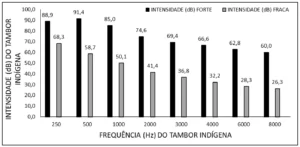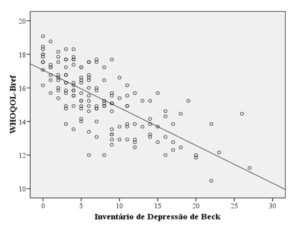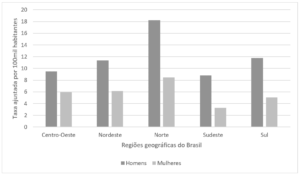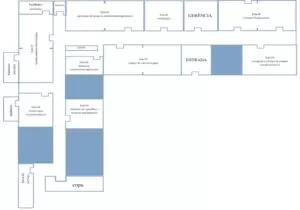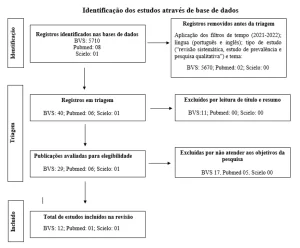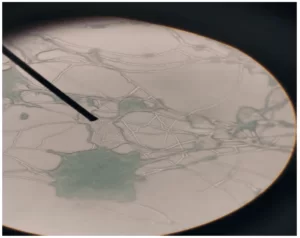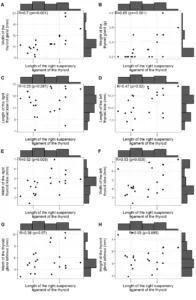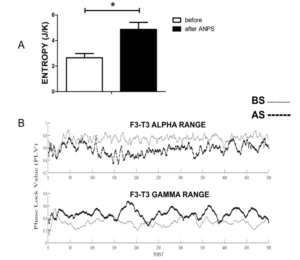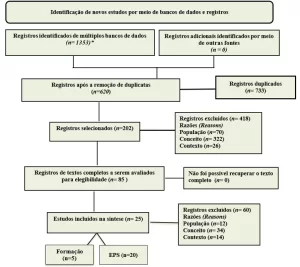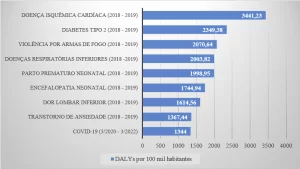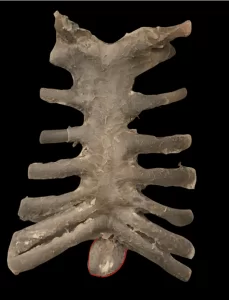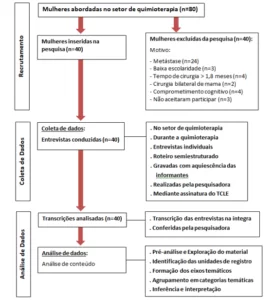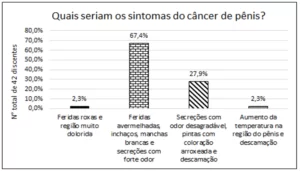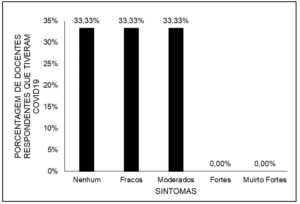SANTOS, Cristina do Socorro Costa Levy [1]
AZEVEDO, Vitória Augusta Machado de [2]
MORAIS, Elisângela Claudia de Medeiros [3]
DENDASCK, Carla Viana [4]
OLIVEIRA, Margaret de [5]
OLIVEIRA, Euzébio de [6]
SANTOS, Cristina do Socorro Costa Levy; et.al. Care taken by the Nursing Team in front of Mastectomized Clients: Literature Review. Multidisciplinary Scientific Journal. Special Edition of Health. Year 02, Issue 11, Vol. 04. pp. 84-95, November of 2017. ISSN:2448-0959
ABSTRACT
The care taken by the nursing team before mastectomized clients is the object of a study of paramount importance for the care of these patients. The objective of this study was to identify, in the literature, the care taken by the nursing team vis-à-vis mastectomized clients. An electronic survey was carried out through the Virtual Health Library Research Portal (VHL), in the databases: Medline, Lilacs, Ibecs, Scielo, BDEnf, Cochrane Library, among other bases of this portal, using the following keywords: nursing, nursing care, mastectomy, breast neoplasms, coping, rehabilitation, self care, published from 2009 to 2013. The sample consisted of seven articles. Of the articles selected 100% report the importance of women receiving information regarding perioperative care that is divided into preoperative, trans-operative and postoperative periods; 90% approached nursing care for women diagnosed with breast cancer and probable evolution to mastectomy; and 40% of the articles address the psychological, social and physical impact as well as acceptance of mutilation. The articles emphasize the educator role of the nurse in the care given to these women, since the lack or inaccuracy in the information provided favors the occurrence of complications. The nurse is the professional prepared to play this role of educator, providing information for the patient and their families, which is highlighted in the Code of Ethics of Brazilian Nursing Professionals. In addition, nursing should promote articulation with other areas of health, with actions that contribute to a quality life as well as to its social reintegration.
Key words: Nursing, Nursing Care, Mastectomy, Breast Neoplasms, Coping, Rehabilitation, Self Care.
1. INTRODUCTION
Malignant mammary neoplasia is the pathology that most terrorizes women, due to its high incidence rate and its psychosocial consequences. It is the most affected by women in the world, both in developed and developing countries, with the highest mortality in developing countries (CANCER NATIONAL INSTITUTE, 2014).
According to INCA (2014), currently in Brazil, 57,129 new cases of mammary carcinomas are expected, with an estimated risk of 56.09 cases per 100,000 women. In the North, it is the second highest incidence tumor affecting 21.29 / 100 thousand women, and for the State of Pará the estimate for 2014 is 21.17 / 100 thousand women and for Capital of the State, Belém, the estimate is 46.78 / 100 thousand women from new cases, in recent years the cancer mortality rate in Brazil has been increasing, it is an indicator that the disease is still diagnosed late.
The occurrence of a malignant neoplasm results from the interaction of genetic and environmental factors, such as: family history, age over 40, female sex, radiation exposure, nutrition, smoking, alcoholism, obesity, first menstruation, menopause (after 50 years), first pregnancy after 30 years (SOUZA et al., 2013).
According to Smeltzer and Bare (2002) breast neoplasm can occur anywhere in the breast, but most appear in the upper outer quadrant, where there is most of the breast tissue. In general, the lesions are insensitive, fixed and stiff with irregular edges.
The therapeutic approach is basically composed of surgery and adjuvant therapies such as chemotherapy, radiation therapy and hormone therapy. The main surgical approach is mastectomy, which consists of a surgical procedure where the total withdrawal of the breast occurs, causing physical restrictions, which diminish the capacity of the body movement, affecting the sexual and social performance of the woman (ANGERAMI-CAMON, GASPAR, 2013 ).
According to Azevedo and Lopes (2006) after the breast removal surgery, the woman experiences a process of acceptance, conformity with the condition of being mastectomized and with the changes occurring in the body itself, constituting a process of elaboration of mechanisms for acceptance of the modified body. The surgery does not affect only the mastectomized, but all around him as: family, group of friends, empowering themselves with indication of the associated treatments (radiotherapy, chemotherapy) to surgery.
Thus, it is important for the multiprofessional team accompanying the patient to identify their anxieties, concerns, longings and fears by helping them cope with them.
In this context, the nursing team is the one that is directly linked to the patient, and finds support in the preoperative visit to provide information that contemplates all actions to be developed in the pre, trans and postoperative (BITTENCOURT; CADETE, 2002). During this time, nursing activities include technical care based on data obtained from the medical records, observation and preoperative interviews.
The woman should receive information about post-surgery care, guidelines and information on the different stages of recovery, how surgery will be performed, arm care, exercises that restore functional capacity of the arm and shoulder, and information about other treatments such as radiotherapy, chemotherapy and hormone therapy. By means of communication, the nursing team should help the mastectomized to conceptualize their problems, assign meanings to the events in their life and mainly seek alternatives of solutions (ALVES, 2011; BARRETO et al., 2008; MOURÃO, 2011).
Thus, the nursing theme adopted by the nursing team in front of mastectomized clients, addresses the follow-up to the woman in all phases of the disease, from the preoperative visit to the surgical recovery. In order to establish this care, it is essential the nursing team’s knowledge of the reality of this woman, especially in the postoperative period, making possible, through technical and scientific support, the best way for this woman to face the disease and to have a better readaptation.
Thus, the proposal of the present study, whose original contribution consists in addressing aspects related to breast cancer, as well as the necessary care after mastectomy, is justified; in the hope of contributing to a better training, sensitization and instrumentalization of the nursing team in relation to the theme and, thus, to promote a more qualified assistance to these women.
Based on these assumptions, this study aimed to identify, in the literature, the care taken by the nursing team vis-à-vis mastectomized clients.
2. MATERIAL AND METHODS
To carry out the study, the method of bibliographical research was used, according to Fonseca (2002, p.32):
It is made from the collection of theoretical references already analyzed, and published by written and electronic means, such as books, scientific articles, web site pages. […] It allows the researcher to know what has already been studied on the subject. There a[…]re scientific researches that rely solely on bibliographical research looking for theoretical references published with the objective of collecting information or previous knowledge about the problem on which the answer is sought.
An electronic survey was carried out through the Virtual Health Library (VHL) research portal, in the databases: Medline, Lilacs, Ibecs, Scielo, BDEnf, Cochrane Library, among other bases of this portal.
Inclusion criteria were considered researches that address the theme nursing care adopted by mastectomized clients in Portuguese and Spanish with available text. In the period from 2009 to 2013. There was no restriction on study design. The descriptors chosen according to the DeCS / MeSH list were: nursing, nursing care, mastectomy, breast neoplasms, coping, rehabilitation, self-care.
We excluded from this study articles that did not meet the inclusion criteria.
For the analysis and synthesis of the material the following procedures were applied: exploratory reading of the material to know the content of the articles; selective reading, which constituted in the selection of the material as to its importance and characteristic for the study; critical reading that will seek the theme in question; tabulation of the articles with the identification of the object of study, and later descriptive analysis.
3. RESULTS
The documents collected in the bibliographic search were evaluated for the inclusion and exclusion condition, based on the eligibility criteria.
In the total of the electronic search it was obtained 30 articles; arranged in the following bases: Lilacs (23); Medline (4) and IBECS (Spain) (3); only 7 met the inclusion criteria for the review. The others were excluded because they did not meet the inclusion criteria.
After the exploratory reading of the same, it was possible to identify articles on nursing care adopted by mastectomized clients.
Table 1 – Distribution of bibliographical references about the care taken by the nursing team in front of mastectomized clients, in the period from 2009 to 2013.
4. DISCUSSION
Table 1 shows data from the distribution of the studies included in the research according to: authors, title, year of publication, objective, methodology, nursing care adopted before mastectomized clients and the conclusion.
During the period from 2009 to 2013, the year that presented the highest number of published works available electronically with the theme in focus was 2010 (4 articles), followed by the year 2013 (2) and 2012 (1). The works were rescued in the Lilacs database (7 articles), while the country of origin of the selected research was Brazil. This may be due to the fact that Portuguese and Spanish have been defined in the search methodology for material. It should be emphasized that the type of study was not taken into account.
It is known that mastectomy is an aggressive surgical procedure accompanied by traumatic consequences in the life and health experiences of the woman, so the nursing care in this period is fundamental.
Of the articles selected, 100% report the importance of women receiving information regarding perioperative care that is divided into preoperative, trans-operative and postoperative periods. After the surgery, it is necessary, through the nursing team, to provide guidance on the different stages of recovery, as well as clarifications on other treatments such as chemotherapy, radiotherapy and hormone therapy (ALVES et al., 2011; MOURÃO et al. In addition, the results of the present study are similar to those reported in the literature.
For Alves et al. (2011), this information and guidance are considered essential to reduce anxiety and fear of diagnosis and treatment. Thus, the importance of information about disease, treatment and its consequences are paramount.
Corroborating Santos et al. (2010) say that the nursing team plays an important role because it must establish a therapeutic communication with the woman to provide nursing care that, in turn, meets the expectations and needs of these women, ensuring physical, emotional and spiritual comfort.
Mendes, Lindolpho and Leite (2012, p.431) state that nursing must act in a way that ‘preserves the autonomy and dignity’ of mastectomized women, protecting their physical and mental integrity.
It was also observed that 90% of the articles deal with the care of women diagnosed with breast cancer and probable evolution to mastectomy.
The nursing team must consider that for the care to be effective, it is necessary an interactive process, in which the professional applies beyond the technical skill, knowledge and, above all, humanization with the individual to be care in all the periods of the treatment ( MOURÃO et al., 2013).
In this way, the nursing team should know the specific needs of each one, evaluate their needs and build a care plan that values their completeness and individuality (Mourão et al., 2013; Pereira et al., 2013).
For Mendes, Lindolpho and Leite (2012), nursing care in day-to-day care should be reflected in a quality nursing care that aims at self-care, aiming at improving the patient’s quality of life and, recognition of the professional when establishing a good nurse-patient relationship.
Still, according to the aforementioned authors, it is imperative that nursing always seek differentiated perspectives in caring for the cancer patient. It is important for nursing to be alert to changes and novelties in treatments in order to offer comprehensive care free of myths and taboos. In addition, it is necessary to emphasize the need to elaborate assistance protocols directed to the assistance to this woman, taking into account the regional and socio-cultural differences.
Alves et al. (2011) point out that for the recovery of these women, besides the professional performance, the support given by the family and social network is fundamental, since the changes occurred after the treatment of the disease are significant and transformative. There is need for support from close people, such as spouses, children and friends.
To achieve this goal, it is necessary the development by the nursing team of educational actions that help patients and their caregivers to acquire knowledge and skills about the various aspects of their self-care (ALVES et al., 2011).
Silva et al. (2010) affirm that nursing actions have fundamental importance in the group activities with the mastectomized women, in order to minimize the identified conflicts, stimulating self-care and valuing each participant as a unique being. Support and guidance not only for mastectomized women, but also for the family, which is an essential part of the treatment, is important because if the emotional support is of a quality it will be very significant in the recovery of the woman, helping her to improve of self-esteem and consequently contributing to the recovery of self-image.
Another important aspect addressed in 40% of the selected articles is the psychological, social and physical impact as well as the acceptance to the mutilation. In this context, Pereira et al. (2013) argue that cancer is among the diseases that most cause fear and worry, creating a stigmatized image of suffering, aversion and death.
According to Silva et al. (2010) the woman affected by breast cancer experiences, in its trajectory, numerous situations. These, in general, relate to their biopsychosocial integrity, the uncertainty of treatment success, the possibility of recurrence and death. Accepting your new condition and adapting to the new image of your body requires a very large effort for which you are not prepared.
It is clear that the body changes resulting from total or partial mastectomy have great significance for the lives of these women, mainly because they are permanent changes and aesthetically outside the standards imposed by society (PEREIRA et al., 2013).
The imminence of breast withdrawal and disinformation has a negative weight, which considerably favors vulnerability, fragility, and even the lack of support for them in experiencing this moment.
Therefore, nursing care should include measures to prevent or minimize women-reported distress after breast cancer diagnosis and subsequent treatment, and include the mobilization of available social support, emphasis on psychosocial issues, and the provision of information to (Alves et al., 2011). In the present study, the results of the study are presented in Table 1.
CONCLUSION
Nursing care in oncology has evolved a great deal since its emergence as a specialty, and the literature points out and advocates the importance of nursing to support oncologic patients and their families in the various stages of their illness: primary and secondary prevention, treatment, rehabilitation and disease advanced.
Thus, the articles highlight the role of the nurse in the care given to these women, since the lack or inaccuracy in the information provided favors the occurrence of complications. The nurse is the professional prepared to play this role of educator, providing information for the patient and their families, which is highlighted in the Code of Ethics of Brazilian Nursing Professionals.
In addition, nursing should promote articulation with other areas of health, with actions that contribute to a quality life as well as to its social reintegration.
REFERENCES
ALVES, P.C et al. Pre-operative nursing care and mastectomy rehabilitation: narrative review of the literature. Rev. bras. enferm., Brasília, v. 64, n. 4, Aug. 2011.
ANGERAMI-CAMON, V. A .; GASPAR, K. C. Psychology and cancer. São Paulo: House of the Psychologist, 2013.
AZEVEDO, R. F .; LOPES, R. L. M. Experience of the diagnosis of breast cancer and radical mastectomy: perception of the female body from phenomenology. Online Brazilian Journal of Nursing, Niterói (RJ), v. 5, n.1, Apr. 2006.
BARRETO, R.A.S. et al. The information needs of mastectomized women subsidizing nursing care. Rev. Eletr. Enf. [Internet]. v. 10, n. 1, p. 110-23, 2008.
BITTENCOURT, J.F. V .; CADETE, M. M. mastectomized: clarifications and orientations. 420-3, 2002.
Experiences of the woman to be Rev Bras Enferm. v. 55, n. 4, p. FONSECA, J. J. S. Methodology of scientific research. Fortaleza: UEC, 2002.
NUCLEAR CANCER INSTITUTE JOSÉ ALENCAR GOMES DA SILVA. General Coordination of Strategic Actions. Education Coordination. Incidence of cancer in Brazil. Rio de Janeiro, 2014.
MENDES, A. B. P .; LINDOLPHO, M.C .; LEITE, A. P. Nurse’s assistance in the view of mastectomized women. Global nursing, n. 26, apr. 2012.
MOURÃO, C. M. L. et al. Evidence for the care of the mastectomized woman in the perioperative period. Rev. RENE, v. 14, n. 6, p. 1232-40, Nov.-Dec. 2013.
MOURÃO, C. M. L. Evidence for the perioperative care of mastectomized women: an integrative review of the literature. 2011. 70f. Dissertation (Master degree) Federal University of Ceará, Postgraduate Program in Nursing. Fortaleza, Ceará, 2011.
OLIVEIRA, S. K. P. et al. Systematization of nursing care for mastectomized women. Cogitare Enferm., V. 15, n. 2, p. 319-26, Apr / Jun. 2010
PEREIRA, C. M. et al. The sick and surviving breast cancer: the experience of the woman mastectomized. R. pesq. found. online, v. 5, n. 2, p. 3837-46.abr./jun. 2013.
SANTOS, M. C. L. et al. Therapeutic communication in preoperative mastectomy care. Rev. bras. enferm., Brasília, v. 63, n. 4, Aug. 2010
SILVA, S.E. D. et al. Social representations of mastectomized women and their implications for self-care. Rev. bras. enferm., Brasília, v. 63, n. 5, out. 2010
SMELTZER, S. C .; BARE, B. G. Brunner and Suddarth – Medical-surgical nursing treaty. 9. ed. Rio de Janeiro: Guanabara Koogan, 2002. 1813p.
SOUZA, M. M. et al. Mortality rate due to malignant neoplasia of breast in women residing in the region of Carbonífera Catarinense from 1980 to 2009. Cad. health collection, Rio de Janeir, v. 21, n. 4, 2013.
[1] Nurse graduated from the Metropolitan College of Amazonia (FAMAZ).
[2] Nurse graduated from the Metropolitan College of Amazonia (FAMAZ).
[3] Psychologist. Master in Theory and Behavior Research. PhD student in Tropical Diseases at the UFPA Tropical Medicine Center (NMT-UFPA). Lecturer at the State University of Pará – UEPA
[4] PhD in Clinical Psychoanalysis, Researcher at the Center for Research and Advanced Studies.
[5] Registered Nurse and Bachelors in Nursing Science. USA – California
[6] Biologist. Doctor of Medicine / Tropical Diseases. Professor and Researcher at the Federal University of Pará – UFPA. Researcher at the Laboratory of Human and Environmental Toxicology and in the Laboratory of Oxidative Stress of the Nucleus of Tropical Medicine of UFPA (NMT-UFPA).








